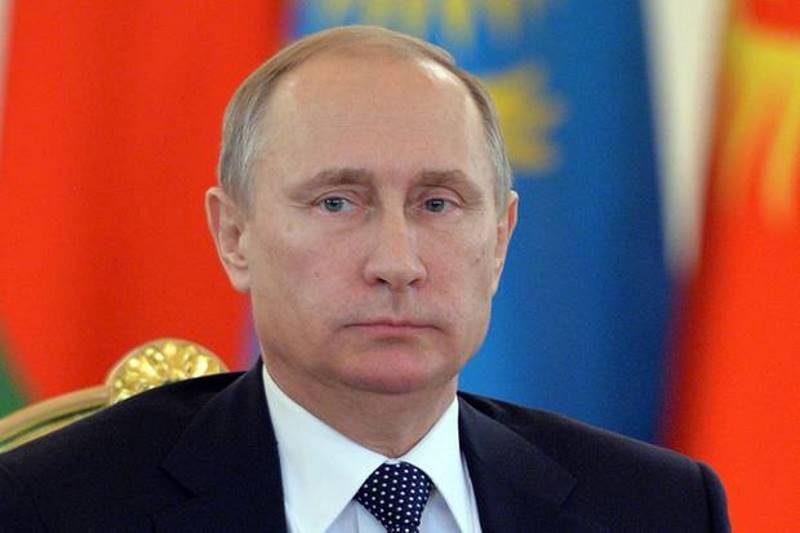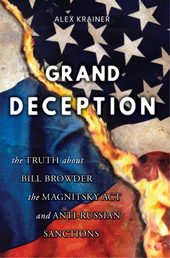Joseph Goebbels' teknik om med den store løgn omfatter at bedrage folk med store, grove løgne og gentage dem uophørligt. Hvis sandheden sætter os fri, må vi sprede den med kækhed og beslutsomhed. Vi må skubbe igen og udstille løgnene. De som ønsker krige er få, og de, som ønsker fred, er mange. Gør din del, afvis frygt og løgne og sammen kan vi bringe en ende til nutidens dystopiske tilstand af permanent krig.
A good example of the big lie is the way Bill Browder "proved" Putin's corruption. His proof is laughable, yet corporate media treat Browder as an expert on the matter and repeat his allegations as though they were unquestionable facts. As suspicious as such blatant bias should be, the big lie technique seems to work. Today, most westerners seem inclined to believe that Putin routinely has critics and political rivals assassinated, that he amassed a vast personal fortune and that he runs Russia as his own personal fiefdom.
The demonization that gave rise to these beliefs is not an accident of chance. As we've already seen through examples of Slobodan Milosevic (Serbia), Saddam Hussein (Iraq), Moammar Gaddafi (Libya) and Bashar Al Assad (Syria), vilifying a foreign leader is regularly used to generate public consent for war. Negative perception of target nations' leaders predisposes the public, especially those who deem themselves fair minded and progressive, to accept war or regime change operations as a way to "help" that nation free itself from political oppression and gain greater freedom and democracy.
Wars for resources or hegemony may not be acceptable to the public, but fighting wars to protect human rights is a different matter. Over the years I've heard many otherwise well-meaning and learned intellectuals strain to justify even clearly illegal wars, so long as they believed them to be motivated by human rights considerations.
Another big war could happen
In the age of permanent warfare we should not complacently believe that another world war is impossible. There are well understood (but never discussed) systemic reasons why a part of the western economic/political establishment regularly resorts to war as their preferred policy tool. They positively desire such a war and their agenda is not burdened by moral scruples that would inhibit 99.9% of us.
Having lived in the 1990s through the outbreak of war in former Yugoslavia I felt the obligation to discover the truth and to do my part to expose the big lie that could catalyze the next world war. The product of my effort is the book Grand Deception (now banned by those who wish for war against Russia) from where the following series of articles was excerpted.
Excerpt: why even bother about who Putin is as a man?
For a long time, even after Bill Browder alerted me to the fact that Putin might actually be a force for good in Russia, I had little interest in understanding Putin as a man. I thought of him as a politician and I generally subscribe to the idea that political power attracts precisely the sort of people who should not have it. I also believe that power corrupts even otherwise decent men and women, and I expected that Vladimir Putin was no different. It was not difficult for me to believe that he probably was corrupt and that he used his position to enrich himself, his family members and his associates. That, at any rate, is what everyone else in the west knew about Mr. Putin.
It was only as a consequence of the shrill and constant demonization of Vladimir Putin in the aftermath of the 2014 coup in Ukraine that I felt compelled to try and find out more about who he was as a person. I started by watching many of his speeches and interviews, listening carefully at what he was saying, as well as the way he was speaking.
In his famous "Munich speech" the Russian President delivered on February 10, 2007, Putin called attention to the crumbling system of international relations in the post-Cold War era and the inevitable doom of the unipolar world order. In many respects his warnings proved prophetic.
I also watched a number of documentaries about him - a few flattering films and many unflattering ones. I also searched online for testimonials from people who knew him personally and worked with him. The portrait of the man that emerged from many such testimonials as well as his own actions seems to be in a complete discord with the reputation Vladimir Putin had gained in the west. Here are some of the incidences that impacted my own perception of him.
Putting the people first
In the aftermath of the 2008 financial crisis Putin declared publicly that he bore responsibility to ensure that the 1998 crisis would not repeat itself on his watch. His government also took proactive steps to limit the fallout from the crisis. In July 2008, Putin personally went to the town of Pikalyevo in Leningrad Oblast to confront the directors and owners of a large metallurgical factory. This was not long after the owners had shut the facility down, suspending without pay thousands of their workers.
Addressing the gathering, Putin excoriated them, saying that because of their unprofessional conduct and greed, thousands of families would find themselves destitute. This was unacceptable to his government and he ordered the owners to restart the facility, else the government would do it without them. He further ordered the management to immediately ("deadline today") pay all workers' salary arrears, amounting to more than 41 million rubles. This episode was recorded in a news report that subsequently became a very popular video on the internet. This almost certainly served a public relations event, but even so its intent and message was to alert the oligarch class not to treat the lives of their employees as a disposable resource.
Then Prime Minister Vladimir Putin chastised Oleg Deripaska, once Russia's richest man, and other Russian businessmen at a meeting in Pikalyovo.
Putin took similar action protecting the ordinary people in another crisis situation. During his first winter as president, entire towns and villages across the far east of the country counting as many as 400,000 inhabitants, lost heating for the lack of coal. A serious crisis emerged with mines shutting down, workers out in the streets and even hospitals ceasing to function because of the cold. But the coal for heating was available in Russia, only most of it was already allotted for export. Vladimir Putin didn't think that Russian people should suffer freezing conditions all winter in order for that coal to be exchanged for American dollars. He decreed that export of coal be stopped immediately and that all available quantities be sent back to Siberia to fuel the boiler stations.
What these examples show is that in Putin's world, well-being of the people takes precedence over financial profits of the investor class. This concept may seem exotic and alien to Westerners who for a generation had been brainwashed with neoliberal economics where profits trump any and every other concern, including health and well-being of the people.
In stark contrast listen to what Larry Kudlow, currently the Director of the National Economic Council under President Donald Trump, had to say in the immediate aftermath of Japan's March 2011 tsunami that killed at least 20,000 people: "The human toll here looks to be much worse than the economic toll and we can be grateful for that."
I do believe however that, beyond the brainwash, every normal person - even western-educated economists - would agree that in a crisis, the decent thing to do would be to take care of the people and let the oligarchs cope with one quarter or a year of impaired profitability of their enterprises.
To be continued...
Alex Krainer is a hedge fund manager and author. His book, twice banned by Amazon in September 2017 and again in August 2018 is now available in pdf, kindle, and epub formats at the following link "Grand Deception: Truth About Bill Browder, the Magnitsky Act and Anti-Russian Sanctions." Paperback version published by Red Pill Press is now available here. Alex also wrote one book on commodities trading.





Læserkommentarer
dig vores Nyhedsbrev